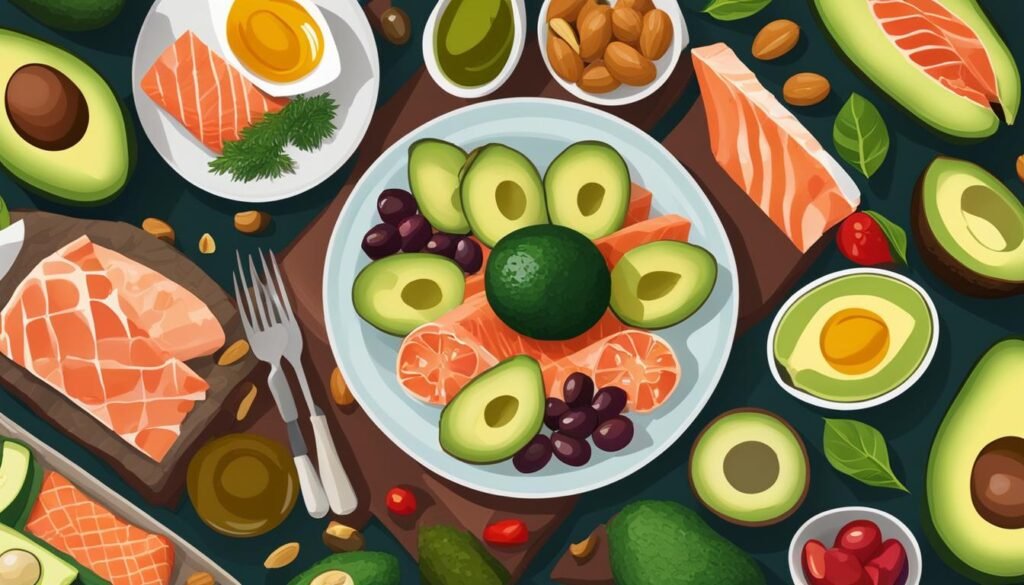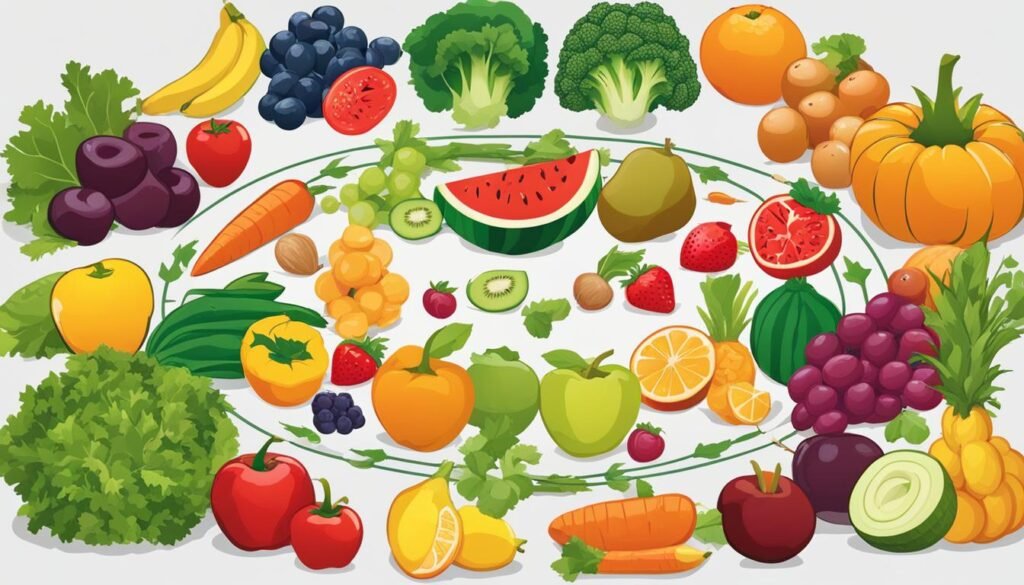As fitness enthusiasts, we all understand the importance of maintaining and preserving muscle mass. It is not just about looking good; it is about ensuring that our bodies stay strong, functional, and healthy. One of the key factors that contribute to muscle mass maintenance is nutrition. By fueling our bodies with the right nutrients and following a muscle preserving diet, we can optimize our muscle-building potential and achieve our fitness goals. In this guide, we will provide you with 10 essential nutrition and supplement rules to help you preserve and maintain your hard-earned muscle mass effectively.
Key Takeaways:
- Nutrition plays a crucial role in preserving muscle mass.
- Focusing on macronutrients, calories, meal timing, and supplements can impact muscle growth and strength.
- Protein intake is essential for muscle preservation.
- Carbohydrates provide energy during workouts and help maintain muscle fullness.
- Including healthy fats in your diet is important for muscle retention.
The Importance of Protein for Muscle Preservation
When it comes to preserving muscle mass, protein is a key nutrient that should not be overlooked. Consuming an adequate amount of protein is essential for maintaining and building muscle. It is recommended to consume at least 1 gram of protein per pound of bodyweight daily. This provides the amino acids necessary for muscle protein synthesis, which is the process that allows your muscles to grow and repair themselves.
For beginners, aiming for 1.5 grams of protein per pound of bodyweight during the first six months of working out can be beneficial. Lean animal proteins such as chicken, turkey, beef, fish, eggs, and dairy are excellent sources of complete protein. These protein sources not only provide the necessary amino acids but also contain other important nutrients for muscle growth, such as leucine, which is known to stimulate muscle protein synthesis.
| Protein Source | Protein Content (per 100g) |
|---|---|
| Chicken Breast | 31g |
| Turkey Breast | 29g |
| Lean Beef | 26g |
| Salmon | 22g |
| Eggs | 13g |
| Greek Yogurt | 10g |
Including protein-rich foods in your diet and spreading your protein intake throughout the day can help optimize muscle preservation and support your fitness goals.
The Role of Carbohydrates in Muscle Preservation
When it comes to maintaining and preserving muscle mass, carbohydrates play a crucial role in providing the necessary energy for workouts and supporting muscle fullness. Including the right types and amounts of carbohydrates in your diet is essential for optimizing muscle preservation and overall performance.
It is recommended to consume 2-3 grams of carbohydrates per pound of bodyweight daily. Slow-digesting carbohydrate sources like whole grains, oatmeal, sweet potatoes, beans, fruits, and vegetables should be the primary sources of carbohydrates in your diet. These complex carbohydrates release energy slowly, providing a sustained fuel source for your workouts and helping to maintain stable blood sugar levels throughout the day.
In addition to their energy-providing role, carbohydrates also play a part in muscle glycogen replenishment. Glycogen is the stored form of glucose in the muscles and serves as an important fuel source during exercise. By consuming a sufficient amount of carbohydrates, you can ensure that your muscles have an adequate glycogen store, allowing for optimal performance and enhanced muscle preservation.
The Importance of Complex Carbohydrates
Complex carbohydrates, found in foods such as whole grains, are beneficial for muscle preservation due to their high fiber content. Fiber helps regulate blood sugar levels, aids in digestion, and promotes satiety, preventing excessive calorie consumption. Including complex carbohydrates in your diet not only supports muscle preservation but also promotes overall health and well-being.
| Carbohydrate Sources | Examples |
|---|---|
| Whole Grains | Brown rice, quinoa, whole wheat bread, whole wheat pasta, oats |
| Fruits | Apples, oranges, bananas, berries |
| Vegetables | Sweet potatoes, broccoli, spinach, kale |
| Legumes | Black beans, chickpeas, lentils |
By incorporating these carbohydrate sources into your diet, you can ensure that you are providing your muscles with the necessary energy and nutrients for effective muscle preservation. Remember to balance your carbohydrate intake with other macronutrients, such as protein and healthy fats, to achieve a well-rounded and nutritionally balanced diet for maintaining muscle mass.
The Importance of Healthy Fats for Muscle Retention
When it comes to preserving muscle mass, many people focus solely on protein intake and neglect the importance of healthy fats. However, including healthy fats in your diet is crucial for muscle retention. Not only do fats provide a source of energy, but they also play a key role in hormone production and maintaining optimal levels of testosterone, which is necessary for muscle growth.
To ensure you’re getting the right balance of fats in your diet, aim for about 20-30% of your total daily calories to come from fat. Saturated fats from sources like red meats, monounsaturated fats from avocados and nuts, and polyunsaturated fats from fatty fish and flaxseed oil are all beneficial for maintaining muscle mass.
When it comes to choosing your fat sources, be mindful of the quality of the fats you consume. Opt for lean cuts of red meat, choose heart-healthy oils like olive oil, and incorporate nuts and seeds into your diet. By including these healthy fats in your meals, you’ll not only support muscle retention but also promote overall health and well-being.
The Role of Omega-3 Fatty Acids in Muscle Preservation
One specific type of healthy fat that deserves special attention is omega-3 fatty acids. These essential fats have been shown to have anti-inflammatory properties and can help reduce muscle soreness and inflammation, allowing for quicker recovery and enhanced muscle retention.
Good sources of omega-3 fatty acids include fatty fish like salmon, mackerel, and sardines, as well as walnuts, flaxseeds, and chia seeds. Consider incorporating these foods into your diet regularly to reap the benefits of omega-3 fats for muscle preservation.
| Fat Source | Type of Fat |
|---|---|
| Salmon | Omega-3 fatty acids |
| Avocado | Monounsaturated fats |
| Walnuts | Omega-3 fatty acids |
| Olive Oil | Monounsaturated fats |
| Peanut Butter | Monounsaturated fats |
| Flaxseed Oil | Polyunsaturated fats |

“Including healthy fats in your diet is crucial for muscle retention and overall health.”
Incorporating healthy fats into your nutrition strategy is a key component of muscle preservation. By including a variety of fats from different sources, you provide your body with the essential nutrients it needs to support muscle growth, hormone production, and overall well-being. Remember to choose high-quality sources and aim for a balanced intake of fats to optimize your muscle retention efforts.
Caloric Intake for Muscle Maintenance
To preserve and maintain muscle mass, it is crucial to consume an adequate amount of calories. The right caloric intake provides the energy and nutrients necessary for muscle growth and repair. Aim for a positive calorie balance by consuming 20 calories per pound of bodyweight per day. For example, if you weigh 180 pounds, your daily caloric intake should be approximately 3,600 calories.
It is important to distribute your calorie intake properly among the three macronutrients: protein, carbohydrates, and fat. Aim for 20-30% of calories from protein, 40-60% from carbohydrates, and 20-30% from fat. This balance ensures that your body has the necessary building blocks for muscle growth while also providing energy for workouts and daily activities.
Rather than focusing solely on the total number of calories consumed, pay attention to the quality of the calories as well. Choose nutrient-dense foods that provide a wide range of vitamins, minerals, and antioxidants. Incorporate lean sources of protein such as chicken, turkey, fish, and plant-based proteins. Include complex carbohydrates like whole grains, fruits, and vegetables, as well as healthy fats from sources like avocados, nuts, and olive oil.
It is also essential to listen to your body and adjust your caloric intake based on your individual needs and goals. If you are looking to build muscle, you may need to increase your caloric intake slightly to support the energy demands of intense workouts. On the other hand, if your goal is to maintain your current muscle mass, you may need to find a balance between consuming enough calories to support muscle growth and avoiding excessive weight gain.
The Role of Caloric Surplus and Deficit in Muscle Maintenance
When it comes to caloric intake for muscle maintenance, it is important to consider the concept of a caloric surplus and deficit. A caloric surplus occurs when you consume more calories than your body needs, resulting in weight gain. This can be beneficial for those looking to build muscle, as the excess calories provide the necessary energy for muscle growth. However, it is important to monitor the surplus to avoid excessive fat gain.
On the other hand, a caloric deficit occurs when you consume fewer calories than your body needs, resulting in weight loss. While a caloric deficit may be necessary for those looking to lose body fat, it can also lead to muscle loss if not done correctly. To prevent muscle loss during a caloric deficit, it is important to prioritize protein intake, maintain strength training, and monitor your progress regularly.
In conclusion, caloric intake plays a crucial role in muscle maintenance. Aim for a daily caloric intake that supports your individual goals and distribute your calories among the three macronutrients. Focus on consuming nutrient-dense foods and listen to your body’s needs. Whether you are looking to build muscle or maintain your current muscle mass, finding the right balance of calories is key to achieving your fitness goals.
Nutrition Strategies for Muscle Preservation
In order to effectively preserve and maintain muscle mass, implementing proper nutrition strategies is crucial. By following these guidelines, you can optimize your muscle-building potential and achieve your fitness goals. Let’s explore some key strategies below:
1. Eat Balanced Meals Every 2-3 Hours
The frequency and timing of your meals play a significant role in muscle preservation. Aim to have a balanced meal containing quality protein and carbohydrates every 2-3 hours. This approach ensures a steady supply of energy and amino acids for muscle growth throughout the day. To maintain an optimal muscle-preserving diet, aim for at least six meals per day, each consisting of approximately 500-600 calories for a 180-pound individual.
2. Prioritize High-Quality Protein Sources
Consuming adequate protein is essential for muscle preservation. Include lean animal proteins, such as chicken, turkey, beef, fish, eggs, and dairy, in your diet. These sources provide the necessary amino acids for muscle protein synthesis. Aim to consume at least 1 gram of protein per pound of bodyweight daily, adjusting it based on your fitness level and goals.
3. Optimize Carbohydrate Consumption
Carbohydrates are a vital macronutrient for muscle preservation. Focus on consuming slow-digesting carb sources like whole grains, oatmeal, sweet potatoes, beans, fruits, and vegetables. Aim for 2-3 grams of carbohydrates per pound of bodyweight daily. These carbs are stored as glycogen in muscles, providing energy during workouts and helping to maintain muscle fullness.
| High-Quality Protein Sources | Carbohydrate Sources |
|---|---|
| Chicken | Whole grains |
| Turkey | Oatmeal |
| Beef | Sweet potatoes |
| Fish | Beans |
| Eggs | Fruits |
| Dairy | Vegetables |
Implementing these nutrition strategies will provide your body with the fuel it needs to preserve and maintain your muscle mass effectively. By prioritizing balanced meals, high-quality protein sources, and optimal carbohydrate consumption, you can optimize your muscle retention and achieve your fitness goals.
The Role of Protein Shakes in Muscle Retention
When it comes to preserving muscle mass, protein shakes can be a valuable addition to your diet. These convenient and easily digestible shakes provide a quick and efficient source of protein, which is crucial for muscle growth and recovery.
Consuming a protein shake before your workout can help prepare your muscles for training. The amino acids from the protein will be readily available during your workout, providing the building blocks necessary for muscle protein synthesis. This can help improve your performance and enhance muscle growth.
After your workout, it’s important to replenish your muscles with nutrients to aid in recovery and promote muscle retention. Consuming a protein shake immediately following your workout can help kickstart the recovery process by providing the necessary amino acids to repair and rebuild your muscles. Pairing your post-workout shake with a fast-digesting carbohydrate can further enhance the recovery process by replenishing muscle glycogen levels.
When choosing a protein shake, opt for whey protein or a mix of whey and casein. Whey protein is quickly absorbed by the body, making it an excellent option for pre-workout consumption. Casein protein, on the other hand, is slower digesting and can provide a sustained release of amino acids throughout the day or before bed. Incorporating both types of protein into your diet can provide a well-rounded approach to muscle retention.
In summary, protein shakes can play a beneficial role in muscle retention by providing a convenient source of quality protein. Consuming a protein shake before and after your workouts can help optimize muscle growth and recovery. When selecting a protein shake, choose options that contain whey protein or a mix of whey and casein for a well-rounded approach to muscle preservation.
The Role of Optimal Carb Timing in Muscle Preservation

When it comes to preserving muscle mass, timing your carbohydrate intake can make a significant difference. Consuming the right types of carbohydrates at specific times can enhance energy levels, promote muscle glycogen replenishment, and support muscle protein synthesis. Let’s take a closer look at the optimal carb timing strategies for muscle preservation.
Pre-Workout Carbs: Sustained Energy and Fat Burning
Consuming slow-digesting carbohydrates, such as fruits, whole-grain bread, and oatmeal, about 30 minutes before your workout can provide sustained energy during exercise. These carbs release glucose gradually, ensuring a steady supply of fuel for your muscles. Additionally, slow-digesting carbs can help your body burn more fat during exercise, making them an excellent choice for individuals aiming to preserve muscle while shedding excess body fat.
Post-Workout Carbs: Muscle Recovery and Glycogen Replenishment
After an intense workout, your muscles need nutrients to recover and rebuild. Fast-digesting carbohydrates like white bread, plain bagels, baked potatoes, or sports drinks can rapidly elevate insulin levels, promoting muscle glycogen replenishment and facilitating muscle protein synthesis. This combination of fast-digesting carbs and protein stimulates muscle repair and growth, helping you preserve and develop your lean muscle mass.
| Carbohydrate Timing | Benefits |
|---|---|
| Pre-Workout Carbs | – Sustained energy during exercise |
| – Fat burning during workouts | |
| Post-Workout Carbs | – Muscle recovery and repair |
| – Promotes glycogen replenishment |
By strategically timing your carbohydrate intake before and after your workouts, you can maximize the benefits of these essential macronutrients for muscle preservation. Remember to choose nutrient-dense carb sources that align with your overall dietary goals and preferences. Experiment with different options to find the combinations that work best for you and support your body’s unique needs.
Conclusion
Preserving muscle mass requires a well-planned nutrition strategy. By focusing on protein intake, consuming enough carbohydrates, including healthy fats, maintaining an appropriate calorie intake, eating frequent meals, and incorporating protein shakes and proper carb timing, you can effectively preserve and maintain your muscle mass.
Protein is essential for muscle retention, and it is recommended to consume at least 1 gram of protein per pound of bodyweight daily. Carbohydrates play a crucial role in muscle preservation, providing energy and maintaining muscle fullness. Including healthy fats in your diet is important for maintaining muscle mass, as they help optimize testosterone levels necessary for muscle growth.
Along with macronutrients, paying attention to your caloric intake is vital. Aim for a positive calorie balance of 20 calories per pound of bodyweight per day to support muscle growth. Distribute your calorie intake with 20-30% from protein, 40-60% from carbohydrates, and 20-30% from fat.
Eating frequent meals throughout the day ensures a steady supply of energy and amino acids for muscle growth. Aim to have a meal containing quality protein and carbohydrates every 2-3 hours. Additionally, incorporating protein shakes before and after your workouts can aid in muscle recovery and preparation for training.
Lastly, proper carb timing can enhance muscle preservation. Opt for slow-digesting carbs before your workout for sustained energy and fast-digesting carbs after your workout to promote muscle glycogen replenishment and muscle protein synthesis.
By following these nutrition strategies, you can optimize your muscle-building potential and achieve your fitness goals. Remember, preserving muscle mass requires consistency and dedication to your nutrition plan. With the right approach, you can maintain and preserve your hard-earned muscle mass.
FAQ
How much protein should I consume to preserve muscle mass?
It is recommended to consume at least 1 gram of protein per pound of bodyweight daily.
How many carbohydrates should I consume daily for muscle preservation?
It is recommended to consume 2-3 grams of carbohydrates per pound of bodyweight daily.
What are some good sources of healthy fats for muscle retention?
Good sources of healthy fats include red meats, avocados, mixed nuts, olive oil, fatty fish, flaxseed oil, and walnuts.
How many calories should I consume daily to maintain muscle mass?
Aim for 20 calories per pound of bodyweight per day to ensure a positive calorie balance.
How frequently should I eat meals for muscle preservation?
Aim to have a meal containing quality protein and carbohydrates every 2-3 hours, totaling around six meals per day.
Are protein shakes beneficial for muscle retention?
Yes, consuming protein shakes before and after workouts can aid in muscle recovery and growth.
What is the role of carbs in muscle preservation?
Carbs provide energy during workouts, help maintain muscle fullness, and promote muscle glycogen replenishment and muscle protein synthesis.
How can I optimize muscle preservation through nutrition?
By focusing on protein intake, consuming enough carbohydrates, including healthy fats, maintaining an appropriate calorie intake, eating frequent meals, and incorporating protein shakes and proper carb timing.






